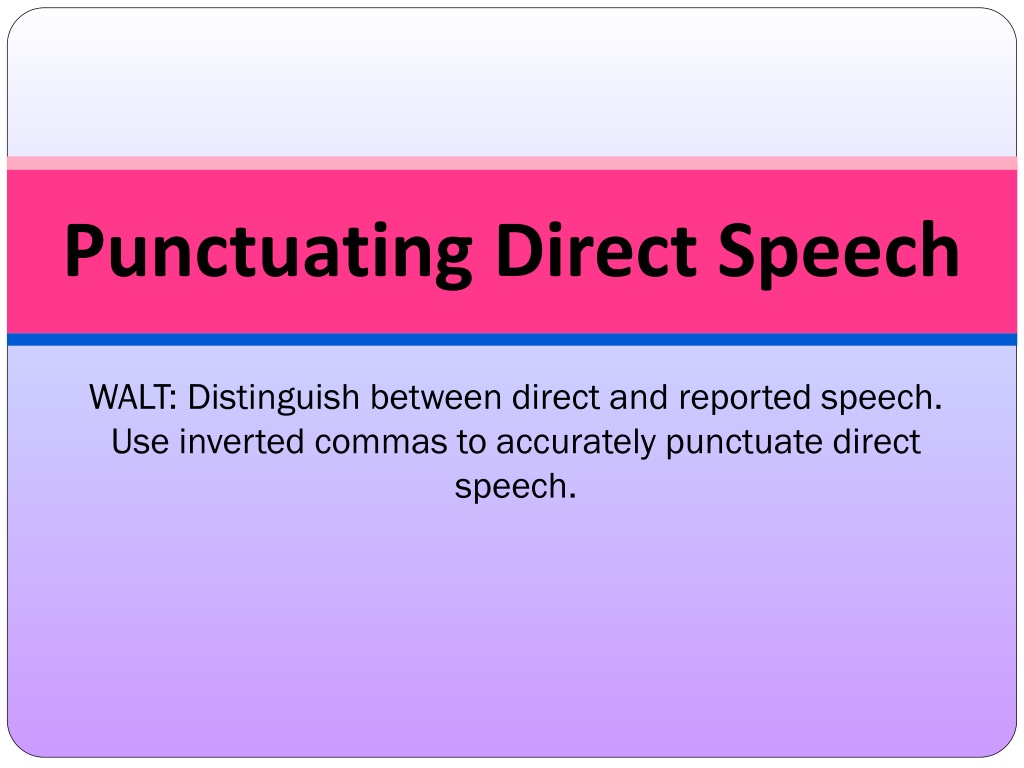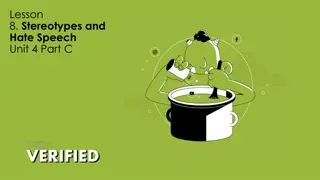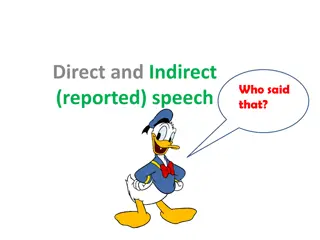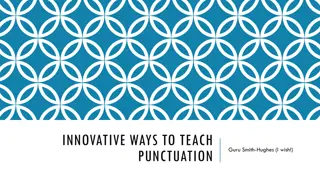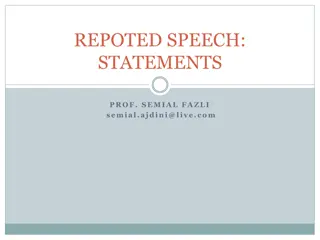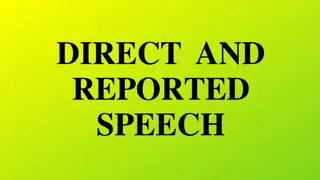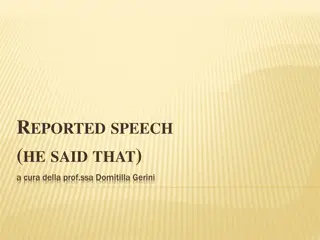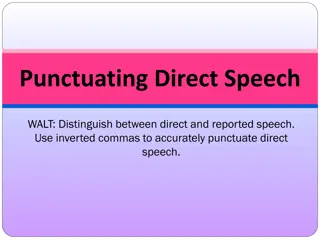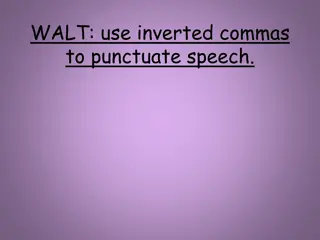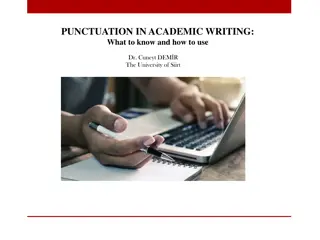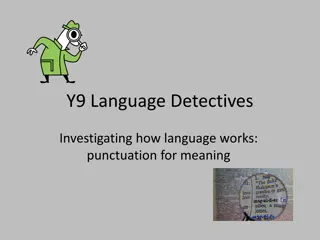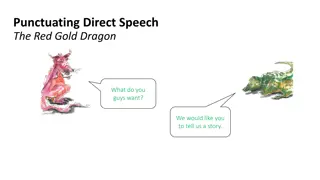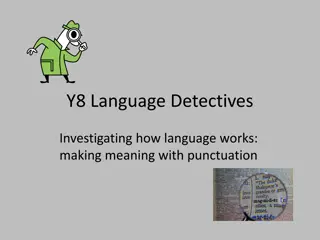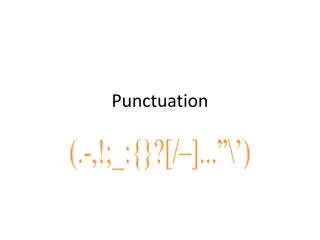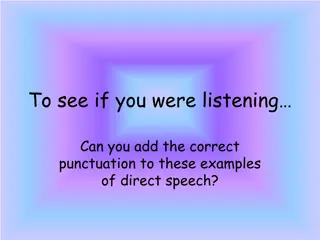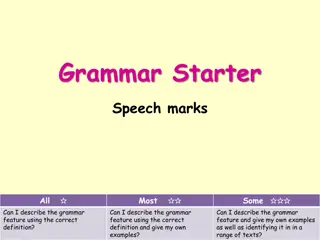Understanding Direct and Reported Speech Punctuation
Distinguishing between direct and reported speech is essential. Direct speech quotes the exact words using inverted commas, while reported speech summarizes without the same words, often in the past tense. In direct speech, present tense and inverted commas are used but not in reported speech.
Download Presentation

Please find below an Image/Link to download the presentation.
The content on the website is provided AS IS for your information and personal use only. It may not be sold, licensed, or shared on other websites without obtaining consent from the author. Download presentation by click this link. If you encounter any issues during the download, it is possible that the publisher has removed the file from their server.
E N D
Presentation Transcript
Punctuating Direct Speech WALT: Distinguish between direct and reported speech. Use inverted commas to accurately punctuate direct speech.
Direct vs. Reported Speech There are two types of speech: direct and reported. Direct speech Direct speech Direct speech Direct speech Direct speech Direct speech Direct speech Direct speech Reported/Indirect speech Reported/Indirect speech Reports a summary of what a person has said has the same meaning but doesn t necessarily use the same words . In the past tense. In the past tense. In the past tense. In the past tense. Reported/Indirect speech Reported/Indirect speech Reports a summary of what a person has said has the same meaning but doesn t necessarily use the same words . use the same words . use the same words . Reported/Indirect speech Reported/Indirect speech Reports a summary of what a person has said has the same meaning but doesn t necessarily meaning but doesn t necessarily Reported/Indirect speech Reported/Indirect speech Reports a summary of what a person has said has the same Quotes the exact words which have been spoken. have been spoken. have been spoken. have been spoken. Quotes the exact words which Quotes the exact words which Quotes the exact words which Usually in the present tense. Inverted commas are placed around what the speaker says. around what the speaker says. around what the speaker says. around what the speaker says. Usually in the present tense. Inverted commas are placed Inverted commas are placed Inverted commas are placed Usually in the present tense. Usually in the present tense. Doesn t use speech marks. Doesn t use speech marks. Doesn t use speech marks. Doesn t use speech marks.
Direct vs. Reported Speech Decide whether each sentence is direct or reported speech Decide whether each sentence is direct or reported speech. . Direct Direct / / Reported Reported Reported Reported Reported Reported Reported Reported Reported Reported Reported Reported Direct Direct Direct Direct Direct Direct Direct Direct / / Direct Direct / / Reported Reported Reported Reported Reported Reported Reported Reported Reported Reported Reported Reported Direct Direct / / Direct Direct / / Reported Reported Reported Reported Reported Reported Direct Direct / / Sentence Sentence Sentence Sentence Sentence Sentence Sentence Sentence Sentence Sentence Sentence Sentence Dad told me he was tired. Josh explained that he supported Chelsea. I wish I could come too! replied Jess Umm... Ella ponderedthoughtfully, I think blueberries are probably my favourite fruit. Mr Turner described the terrifying sight of a wooden ship with black sails attacking the harbour. harbour. harbour. harbour. harbour. harbour. Dad told me he was tired. Josh explained that he supported Chelsea. I wish I could come too! replied Jess Umm... Ella ponderedthoughtfully, I think blueberries are probably my favourite fruit. Mr Turner described the terrifying sight of a wooden ship with black sails attacking the wooden ship with black sails attacking the wooden ship with black sails attacking the wooden ship with black sails attacking the wooden ship with black sails attacking the Dad told me he was tired. Josh explained that he supported Chelsea. I wish I could come too! replied Jess Umm... Ella ponderedthoughtfully, I think blueberries are probably my favourite fruit. Mr Turner described the terrifying sight of a Mr Turner described the terrifying sight of a Mr Turner described the terrifying sight of a Mr Turner described the terrifying sight of a Dad told me he was tired. Josh explained that he supported Chelsea. I wish I could come too! replied Jess Umm... Ella ponderedthoughtfully, I think blueberries are probably my favourite fruit. blueberries are probably my favourite fruit. blueberries are probably my favourite fruit. Dad told me he was tired. Josh explained that he supported Chelsea. I wish I could come too! replied Jess Umm... Ella ponderedthoughtfully, I think Umm... Ella ponderedthoughtfully, I think Dad told me he was tired. Josh explained that he supported Chelsea. I wish I could come too! replied Jess Direct Direct Direct Direct Reported Reported
Direct vs. Reported Speech It is easy to convert between direct and reported speech. For example: Direct speech Direct speech Direct speech Direct speech Reported speech Reported speech Reported speech Reported speech Noah told me his favourite colour was blue. If I had topick just one, I d say blue is my favourite colour, said Noah. colour, said Noah. Areyou busy tonight? asked Jess If I had topick just one, I d say blue is my favourite Jess asked if I was busy that night. night. Jess asked if I was busy that
Direct vs. Reported Speech Reported speech is a simple, but effective, way of moving stories on. For example, instead of having a main character retell a whole series of events (which can take pages of dialogue!) you can simply write that they explained what had happened.
Inverted Commas Inverted commas are also known as speech marks. They are used to show when someone is speaking. Although it may look complicated, by following just a few simple rules you can become an expert at punctuating direct speech.
Rules for Punctuating Direct Speech 1. Place around the words which are spoken. 2. Use a capital letter at the start of a speech sentence (even if it is in the middle of another sentence). 3. Before you close your inverted commas use a comma, question mark or exclamation mark to separate what was said from the speaker. 4. If a new person speaks, start a new line.
For example: Should we tell the humans we can speak English? asked Stuart. Kevin replied, No, definitely not. http://www.wdsu.com/image/view/-/18289490/medRes/1/-/maxh/480/maxw/640/-/b76s38/-/Minions.jpg The punctuation placed before closing the inverted commas is a ? ? as Stuart asked a question No is capitalised because it is the start start of the speech sentence.
For example: You ll win then, murmured Emery, you re much faster than I am. I ll race you there! said Isla. you re doesn t need a capital letter because it is not not the start of the speech sentence. Despite coming after an ! , said is not not capitalised.
Punctuating Direct Speech Can you punctuate the speech in these sentences correctly? Can you punctuate the speech in these sentences correctly? What time are we going out asked Zoe. What time are we going out? Yasmin shouted look out Yasmin shouted, L Look out! ! Besides said Sam thoughtfully what was she doing there anyway Besides, , said Sam thoughtfully, what was she doing there anyway? ? ? asked Zoe. Remember: Put inverted commas around what the speaker says, start each speech sentence with a capital letter and place a piece of punctuation before closing your inverted commas.
Punctuating Direct Speech Can you rewrite this section of text using the correct punctuation? Can you rewrite this section of text using the correct punctuation? did you eat the last doughnut Hannah asked her little brother. no I had carrot sticks for my snack replied Zac innocently. then where questioned Hannah did the sugar all around your mouth come from. smiling mischievously, Zac responded I m not sure, but it definitely wasn t from your doughnut
Punctuating Direct Speech Can you rewrite this section of text using the correct punctuation? Can you rewrite this section of text using the correct punctuation? D Did you eat the last doughnut? ? Hannah asked her little brother. N No, I had carrot sticks for my snack, , replied Zac innocently. T Then where, questioned Hannah, d mouth come from? ? , did the sugar all around your S Smiling mischievously, Zac responded, I definitely wasn t from your doughnut! ! , I m not sure, but it Remember: New speaker, new line.
Reporting Clause Direct speech will almost always need a reporting clause clause. A reporting clause tells the reader who the speaker was and how they spoke. For example: reporting I came 1 I came 1st st! shouted Frank excitedly. ! shouted Frank excitedly. I came 1 I came 1st st! ! shouted Frank excitedly shouted Frank excitedly. . This is a reporting clause reporting clause it tells you that Frank was our speaker and he was shouting excitedly.
Reporting Clause A reporting clause can come before, after or split the direct speech. For example: Location Location Sentence Sentence Dan asked hungrily Dan asked hungrily, Do you know what time lunch is? Do you know what time is lunch is? Dan asked hungrily hungrily. Do you know, Dan asked hungrily Dan asked hungrily, what time lunch is? Before Before Dan asked After After Embedded Embedded Varying the location of the reporting clause keeps your writing interesting for the reader.
Reporting Clause Can you change the position of the reporting clause? Can you change the position of the reporting clause? Location Location Location Location Location Location Sentence Sentence Sentence Sentence Sentence Sentence Darcey whispered quietly, , I think we should hide upstairs. . I think we should hide upstairs, whispered Darcey quietly. I think, , Darcey whispered quietly, , we should hide upstairs. . hide upstairs. . hide upstairs. . Darcey whispered quietly, , I think we should hide upstairs. . I think we should hide upstairs, whispered Darcey quietly. I think, , Darcey whispered quietly, , we should I think, , Darcey whispered quietly, Darcey whispered quietly, , I think we should hide upstairs. . I think we should hide upstairs, whispered Darcey quietly. Before Before Before Before Before Before After After After After After After , we should Embedded Embedded Embedded Embedded Embedded Embedded ***CAREFUL*** ***CAREFUL*** You may have to add, remove or change some punctuation when you move the reporting clause.
Synonyms for Said http://41.media.tumblr.com/tumblr_lubt53SraM1qccdb1o1_1280.png
Synonyms for Said Repeatedly using the word said after every speech sentence is a quick way of making your writing very boring for others to read. Keep a thesaurus handy and refer to it when writing dialogue to keep your writing interesting.
Which is correct? Can I have lemonade to drink? Asked Vivian. Can I have lemonade to drink? Asked Vivian. Can I have lemonade to drink? asked Vivian. Can I have lemonade to drink? asked Vivian. Can I have lemonade to drink, asked Vivian. Can I have lemonade to drink, asked Vivian.
Which is correct? Can I have lemonade to drink? Asked Vivian. Can I have lemonade to drink? Asked Vivian. Can I have lemonade to drink? asked Vivian. Can I have lemonade to drink? asked Vivian. Can I have lemonade to drink, asked Vivian. Can I have lemonade to drink, asked Vivian.
Which is correct? Flynn replied, He said he was going to the park . Flynn replied, He said he was going to the park . Flynn replied, he said he was going to the park. Flynn replied, he said he was going to the park. Flynn replied, He said he was going to the park. Flynn replied, He said he was going to the park.
Which is correct? Flynn replied, He said he was going to the park . Flynn replied, He said he was going to the park . Flynn replied, he said he was going to the park. Flynn replied, he said he was going to the park. Flynn replied, He said he was going to the park. Flynn replied, He said he was going to the park.
Which is correct? I think said mum, that we ll go to the zoo today I think said mum, that we ll go to the zoo today I think, said mum, That we ll go to the zoo today. I think, said mum, That we ll go to the zoo today. I think, said mum, that we ll go to the zoo today. I think, said mum, that we ll go to the zoo today.
Which is correct? I think said mum, that we ll go to the zoo today I think said mum, that we ll go to the zoo today I think, said mum, That we ll go to the zoo today. I think, said mum, That we ll go to the zoo today. I think, said mum, that we ll go to the zoo today. I think, said mum, that we ll go to the zoo today.
Which is correct? I love vanilla ice cream exclaimed Zara excitedly. I love vanilla ice cream exclaimed Zara excitedly. I love vanilla ice cream! exclaimed Zara excitedly. I love vanilla ice cream! exclaimed Zara excitedly. I love vanilla ice cream! Exclaimed Zara excitedly. I love vanilla ice cream! Exclaimed Zara excitedly.
Which is correct? I love vanilla ice cream exclaimed Zara excitedly. I love vanilla ice cream exclaimed Zara excitedly. I love vanilla ice cream! exclaimed Zara excitedly. I love vanilla ice cream! exclaimed Zara excitedly. I love vanilla ice cream! Exclaimed Zara excitedly. I love vanilla ice cream! Exclaimed Zara excitedly.
Which is correct? I m really sorry , said Oscar sadly, but I can t come I m really sorry , said Oscar sadly, but I can t come tomorrow. tomorrow. I m really sorry , said Oscar sadly, But I can t come I m really sorry , said Oscar sadly, But I can t come tomorrow. tomorrow. I m really sorry said Oscar sadly, but I can t come I m really sorry said Oscar sadly, but I can t come tomorrow. tomorrow.
Which is correct? I m really sorry , said Oscar sadly, but I can t come I m really sorry , said Oscar sadly, but I can t come tomorrow. tomorrow. I m really sorry , said Oscar sadly, But I can t come I m really sorry , said Oscar sadly, But I can t come tomorrow. tomorrow. I m really sorry said Oscar sadly, but I can t come I m really sorry said Oscar sadly, but I can t come tomorrow. tomorrow.
